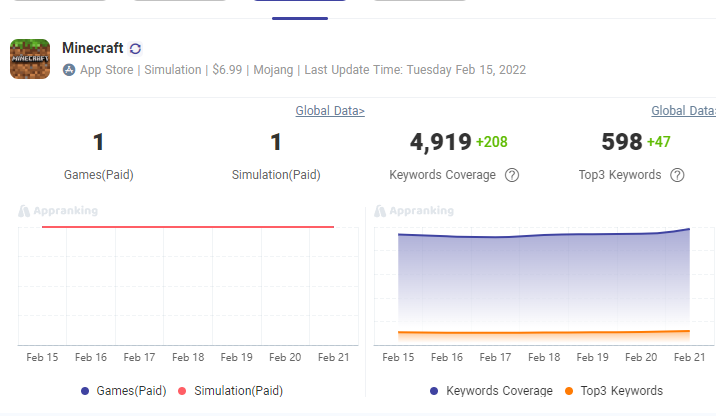As we all know, over 80% of visitors on app marketing will follow the progress of searching to download apps. Searching traffic will be the most important part for most app marketers to drive their mobile growth.
When you fill in your app information, you'll notice that there is a field unique to iOS apps called "Keyword". In contrast to Google, Apple provides you with a specific field where you can enter keywords. This field is private and does not appear in your public App Store listings.
Here, we focus on keyword optimization on Apple Store, to help marketers to make the most out of the keyword field to shorten the time period for keywords to get ranking and maximize the keyword coverage.
Keyword research firstly - make a list of potential keywords
At this point, you know that keywords play an important role in App Store Optimization. They are how your app is found in the App Store and determine how you rank in search results. Keywords tell Apple's search algorithm what your app is about and which App Store search your app should be listed in.
To determine the best keywords for your App Store listing, you should avoid the "less is more" approach. In fact, you should plan to include all search terms that may be relevant to your mobile app.
This means that you will need to do a lot of research to create a large list of possible keywords. There are several ways to do this.
Internal brainstorming
As the creator of the app, you know exactly what you want users to get out of your mobile app. Have your staff collectively discuss possible search terms that relate to all the features and benefits of your app.
Pay attention to who your users are and what phrases they are most likely to use to search for your app. For example, those looking for weather-related apps will search for "local weather conditions" or "is there a forecast near me?".
Also, keep in mind that sometimes the most direct keywords are not the reason users visit your app store listings. Consider which generic search terms and long-tail search terms might drive traffic to your app store listings.
Keep up with the competition
In today's digital world, there are few "new" ideas. Most of the time, the best marketing move is either to copy or improve on someone else's seemingly innovative concept.
For this reason, whether you realize it or not, your competitors are closely monitoring (and copying) your every move. Why not return the favor? Take a close look at your competitors' apps and see which keywords are most popular in their app store listings.
Click "Learn More" to drive your apps & games business with ASO World app promotion service now.
Focus on your users
If you are successfully marketing your app, you will have a dedicated user base that can provide you with valuable keyword insights. Simply look at what your users are saying in their app store reviews, social media posts and other online forums.
You can even use ASO tools to analyze user comments on popular phrases and keywords. In addition, the App Store interface - the Google Play Console and iTunes Connect - will allow you to see which reviews are considered most helpful, allowing you to scan them for potential search terms and key phrases.
To learn more about keyword research, you can check "
How to Find The Right ASO Keywords for Your App" of our previous articles.
A good keyword strategy will reward you with more searching traffic
After completing your initial research, you'll get a long list of possible keywords. But then you realize that you only have 100 characters in the keyword field. This is a way to narrow down the keywords.
Considering that the app name and subtitle have a greater impact on search rankings than the iOS keyword field, you should make sure to put your most promising keywords in your app name and subtitle fields and include more terms in your keyword field. By doing this, you can ensure that your app is indexed for a variety of keyword combinations and search phrases.
The good news is that the algorithm is smart enough to combine keywords from your app name, subtitle and keyword fields. When it comes to ranking for keywords, the iOS keyword field has less ranking weight than the app name or subtitle. But it still has a huge impact on your overall app store optimization.
Big changes may happen when you pay attention to some small improvements!
Convert search terms into single keywords
One of the most important optimizations is that the engine handles the creation of search term combinations from your keywords. This means that you don't have to enter the full search term, but rather its components. For example, the term "buy sneakers" is broken down into "buy" and "sneakers". Apple will automatically create the "buy sneakers" combination for you.
Searches on the App Store tend to be short, and users often don't want to enter (or even consider) complex keywords. If you have any complex words (which can also be long), take the time to find more casual, shorter and overall simpler alternatives.
A 9-character keyword can be replaced with two 4-character keywords. This means there will be more possible search results to rank for. The more keywords you have, the more key phrases are possible.
But remember, relevance is the most important aspect of keyword analysis, not word length. However, when choosing between relevant keywords, you can use length as the tiebreaker.
Remove duplication
After splitting all the terms, list them all and remove any duplicates. They're just ignored. This is where you get the most bang for your buck.
If your goal is the keywords "amazing silver heroes" and "incredible heroic battles", then instead of repeating the keyword "heroes", keep the list as amazing, silver, incredible, heroes, battles.
No need of stop words
You may think that a long phrase is highly relevant to your application and may provide a high ranking. However, using deactivated words such as and, you, to, and for will not contribute to your rankings. They will only take up your precious character limit.
Words like a , the , of , and , for and to are so generic that they don't have much impact on your keyword pool, even when creating random key phrases with other words. It is better to take up the space they occupy and put in some more relevant words.
Use of singulars
There's no need to write the same word in both plural and singular, except to combine the benefits of app names, subtopics and keywords. Remember, we're dealing with a complex algorithm, so if you want to rank courses and courses, "course" is enough to rank in both.
Separate keywords by comma not space
Another common mistake is not separating long-tail keywords with commas. Fearing that the App Store will read all their keywords as one big meaningless keyword, some developers use spaces and commas to separate words. This is unnecessary and will reduce the number of keywords you can use because spaces are counted as characters. This limits the combination and the number of keywords they are ranked for.
Do not leave any of the 100 character spaces blank, every character counts in search rankings. Separate keywords with commas and do not use spaces. Always remember that you will rank based on the keyword combinations contained in the keyword field!
Put the most important keywords early
Just like the application name and subtitle, it matters where you put the keyword in the list. The algorithm cares more about the keywords at the beginning of the list than the keywords at the end. For this reason, your list should start with the most important words and end with keywords that are not highly competitive or targeted for long-tail search terms.
To learn more about keyword optimization, you can check "
How to Conduct Competitive ASO Keyword Optimization Analysis" of our previous articles.







